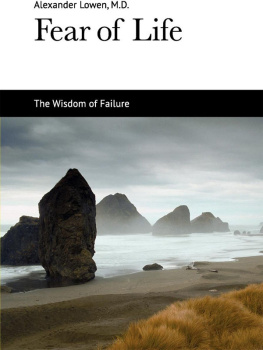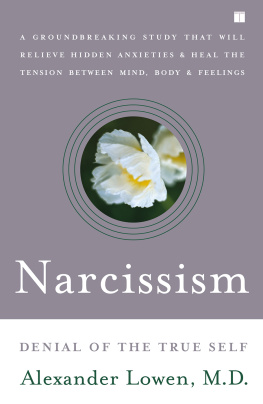Alexander Lowen - Fear of Life
Here you can read online Alexander Lowen - Fear of Life full text of the book (entire story) in english for free. Download pdf and epub, get meaning, cover and reviews about this ebook. year: 2012, publisher: The Alexander Lowen Foundation, genre: Science. Description of the work, (preface) as well as reviews are available. Best literature library LitArk.com created for fans of good reading and offers a wide selection of genres:
Romance novel
Science fiction
Adventure
Detective
Science
History
Home and family
Prose
Art
Politics
Computer
Non-fiction
Religion
Business
Children
Humor
Choose a favorite category and find really read worthwhile books. Enjoy immersion in the world of imagination, feel the emotions of the characters or learn something new for yourself, make an fascinating discovery.
- Book:Fear of Life
- Author:
- Publisher:The Alexander Lowen Foundation
- Genre:
- Year:2012
- Rating:3 / 5
- Favourites:Add to favourites
- Your mark:
- 60
- 1
- 2
- 3
- 4
- 5
Fear of Life: summary, description and annotation
We offer to read an annotation, description, summary or preface (depends on what the author of the book "Fear of Life" wrote himself). If you haven't found the necessary information about the book — write in the comments, we will try to find it.
Fear of Life — read online for free the complete book (whole text) full work
Below is the text of the book, divided by pages. System saving the place of the last page read, allows you to conveniently read the book "Fear of Life" online for free, without having to search again every time where you left off. Put a bookmark, and you can go to the page where you finished reading at any time.
Font size:
Interval:
Bookmark:
Books by Alexander Lowen, M.D.
The Language of the Body (1958)
Originally published as Physical Dynamics of Character Structure
Love and Orgasm: A Revolutionary Guide to Sexual Fulfillment (1965)
The Betrayal of the Body (1967)
Pleasure: A Creative Approach to Life (1970)
Bioenergetics: The Revolutionary Therapy That Uses the Language of the Body to Heal the Problems of the Mind (1976)
Depression and the Body: The Biological Basis of Faith and Reality (1977)
The Way to Vibrant Health: A Manual of Bioenergetic Exercises, co-author Leslie Lowen (1977)
Fear of Life (1980)
Narcissism: Denial of the True Self (1984)
Love, Sex, and Your Heart (1988)
The Spirituality of the Body: Bioenergetics for Grace and Harmony (1990)
Joy: The Surrender to the Body and to Life (1995)
Honoring the Body: The Autobiography of Alexander Lowen, M.D. (2004)
The Voice of the Body: Selected Public Lectures 1962-1982 (2005)
Alexander Lowen, M.D.
The Alexander Lowen Foundation
www.lowenfoundation.org
Fear of Life
Published by The Alexander Lowen Foundation
1852 Texas Hill Rd.
Hinesburg, VT 05461 USA
Phone: 802-338-2866
www.lowenfoundation.org
Copyright 1980 by Alexander Lowen, M.D.
All rights reserved. No part of this book may be reproduced or transmitted in any form or by any means, electronic or mechanical, including photo-copying, recording or by any information storage and retrieval system, without permission in writing from the Publisher.
Except in the United States of America, this book is sold subject to the condition that it shall not, by way of trade or otherwise, be lent, re-sold, hired out, or otherwise circulated without the publisher's prior consent in any form of binding or cover other than that in which it is published and without a similar condition including this condition being imposed on the subsequent publisher.
Library of Congress Cataloging in Publication Data
Lowen, Alexander
Fear of Life
1. Neuroses. 2. Fear. 3. Life. I. Title
RC530.L68 1981 616.85'2 81-9991 AACR2
Library of Congress Control Number 2003111107
ISBN 978-1-938485-02-2 (paperback)
ISBN 978-1-938485-03-9 (ebook)
First Edition by The Alexander Lowen Foundation, 2012
Printed in the United States of America
Dedicated with love to
ROWFRETA L. WALKER
I hitched my wagon to your star.
Contents
What a thing is man! Among all wonders
The wonder of the world is man himself.
Yea, wondrous is man's Sagacity:
Through this he climbeth on high
Through this also he falleth.
In the confidence of his power he stumbleth;
In the stubbornness of his will he goeth down.
-SOPHOCLES, Antigone
Introduction
Neurosis is not usually defined as a fear of life, but that is what it is. The neurotic person is afraid to open his heart to love, afraid to reach out or strike out, afraid to be fully himself. We can explain these fears psychologically. Opening one's heart to love makes one vulnerable to being hurt; reaching out, to being rejected; striking out, to being destroyed. But there is another dimension to this problem. More life or feeling than one is accustomed to is frightening to the person because it threatens to overwhelm his ego, flood his boundaries, and undermine his identity. Being more alive and having more feeling is scary. I worked with a young man whose body was very unalive. It was tight and contracted, his eyes were dull, his skin color sallow, his breathing shallow. By breathing deeply and doing some of the therapeutic exercises, his body became more alive. His eyes brightened, his color improved, he felt tingling sensations in parts of his body, and his legs began to vibrate. But then, he said to me, Man, this is too much life. I can't stand it.
I believe that to some degree we are all in the same situation as this young man. We want to be more alive and feel more, but we are afraid of it. Our fear of life is seen in the way we keep busy so as not to feel, keep running so as not to face ourselves, or get high on liquor or drugs so as not to sense our being. Because we are afraid of life, we seek to control or master it. We believe that it is bad or dangerous to be carried away by our emotions. We admire the person who is cool, who acts without feeling. Our hero is James Bond, Secret Agent 007. The emphasis in our culture is upon doing and achieving. The modern individual is committed to being successful, not to being a person. He belongs rightly to the action generation, whose motto is do more but feel less. This attitude characterizes much of modern sexuality: more action but less passion.
Regardless of how well we perform, we are failures as people. I believe that most of us sense the failure in ourselves. We are dimly aware of the pain, anguish, and despair that lie just below the surface. But we are determined to overcome our weaknesses, override our fears, and surmount our anxieties. This is why books on self-improvement or How to Do It are so popular. Unfortunately, these efforts are bound to fail. Being a person is not something one can do. It is not a performance. It may require that we stop our frantic business, that we take time out to breathe and to feel. In the process we may feel our pain, but if we have the courage to accept it, we will also have pleasure. If we can face our inner emptiness, we will find fulfillment. If we can go through our despair, we will discover joy. In this therapeutic undertaking we may need help.
Is it the fate of modern man to be neurotic, to be afraid of life? My answer is yes, if we define modern man as a member of a culture whose dominant values are power and progress. Since these values characterize Western culture in the twentieth century, it follows that every person who grows up in this culture is neurotic.
The neurotic individual is in conflict with himself. Part of his being is trying to overcome another part. His ego is trying to master his body; his rational mind, to control his feelings; his will, to overcome his fears and anxieties. Though this conflict is in large part unconscious, its effect is to deplete the person's energy and to destroy his peace of mind. Neurosis is internal conflict. The neurotic character takes many forms, but all of them involve a struggle in the individual between what he is and what he believes he should be. Every neurotic individual is caught in this struggle.
How does such a state of internal conflict arise? Why is it the fate of modern man to suffer from these conflicts? In the individual case the neurosis arises within the context of a family situation. But the family situation reflects the cultural one, since the family is subject to all the forces in the society of which it is a part. To understand the existential condition of modern man and to know his fate, we must investigate the sources of conflict in his culture.
We are familiar with some conflicts in our culture. For example, we talk peace, but we prepare for war. We advocate conservation, but we ruthlessly exploit the earth's natural resources for economic gain. We are committed to the goals of power and progress, yet we want pleasure, peace of mind, and stability. We don't realize that power and pleasure are opposing values and that the former often precludes the latter. Power inevitably leads to a struggle for its possession, which often pits father against son and brother against brother. It is a divisive force in a community. Progress denotes a constant activity to change the old into the new under the belief that the new is always superior to the old. While this may be true in some technical areas, it is a dangerous belief. By extension, it implies that the son is superior to the father or that tradition is merely the dead weight of the past. There are cultures in which other values dominate, where respect for the past and for tradition is more important than the desire for change. In these cultures conflict is minimized and neurosis is rare.
Font size:
Interval:
Bookmark:
Similar books «Fear of Life»
Look at similar books to Fear of Life. We have selected literature similar in name and meaning in the hope of providing readers with more options to find new, interesting, not yet read works.
Discussion, reviews of the book Fear of Life and just readers' own opinions. Leave your comments, write what you think about the work, its meaning or the main characters. Specify what exactly you liked and what you didn't like, and why you think so.









